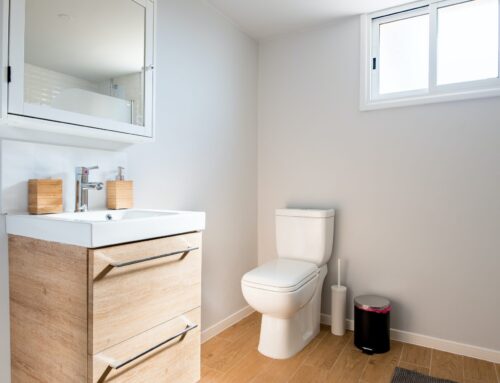We previously explored the role of the microbiome in maintaining our gut health. Now, let’s explore another aspect of gut health, “leaky gut.”
Leaky what???
Yes, the term is a little wonky, and this is what I would imagine saying when I’m 90 and having accidents in my underwear.
However, we are referring to what is more scientifically known as increased intestinal permeability, where the intestinal barrier is no longer intact and somewhat a little “leaky.” Hence the popular name “leaky gut.”
Normal Healthy Intestinal Gut Barrier
Let’s first explore what a normal, healthy intestinal barrier looks like. As you may have figured out already, I like analogies. Humor me momentarily with my overly simplified analogy of a very complex process. I even made an illustration.

*Images adapted with Canva by Eri Shimizu from the original purchased Dreamstime image.
Imagine a castle and the bustling community surrounding it. In the bustling community are merchants, peasants, and a few bad guys who want to overthrow the king and queen. However, it is not easy to get to the king and queen because there is a moat and a high castle wall that is well fortified by cement. The castle gate is well-guarded, and only certain people and goods are allowed through.
Extending this analogy to the intestinal lining, there is a single-cell layer, the castle wall, tightly adjoined by proteins, the cement. Outside the cell layer is a nice mucous layer, the moat, which is partly maintained by beneficial microorganisms in the gut lumen. The cell layer and mucous regulate what can get inside the body. In the gut lumen, we find our food particles and microorganisms, including beneficial ones, which are also busy defending against pathogens.
Back to our castle. Imagine that more bad guys show up outside the gates, causing problems. The king and queen will open many gates, allowing their soldiers to pour out of the castle and eliminate the bad guys. Once the bad guys are gone, they close the extra gates. Business as usual resumes.
In the intestine, when we get a stomach bug or food poisoning, the gaps between the cells, known as tight junctions, open and create “leakiness.” This leakiness allows our immune cells, the soldiers, to flush out and destroy the pathogen. This process is a normal defense mechanism, and when all is clear, the body will close off these junctions and restore an intact barrier.
Leaky Gut Intestinal Barrier

Now, imagine the castle is under siege. The king and queen again open the gates to allow their soldiers to fight the battle, but now the bad guys have pummeled the castle wall, and there are gaping holes. Both the bad guys and scared peasants begin rushing into the castle. In all the chaos, the soldiers may have difficulty discerning friends from foes, and unfortunately, some of the innocent peasants may become casualties.
In this parallel scenario, pathogens, toxins, or certain foods are laying siege to the intestinal barrier. Dysbiosis may also create this problem; an imbalance in the microbiome may mean insufficient beneficial organisms to maintain the mucous barrier or defend against pathogens.
Whatever the source of injury, a lot more leakiness is created; not only are the tight junctions opened, but the intestinal cells themselves are damaged. Many more holes, many more things passing through.
A flood of pathogens and larger food particles freely into the body is problematic. The immune system ramps up to deal with all the “intruders.” This creates inflammation. Unlike Vegas, what happens in the gut does not stay in the gut. This inflammation spreads and affects the entire body, increasing our risk for diseases such as atherosclerosis, heart attacks, and strokes.
Further, our immune system gets confused in the chaos; the immune cells have not seen some of these larger food particles before and can have difficulty discerning friends from foes. As such, antibodies may be made against innocent things like food, and we may start to react adversely to foods we have previously eaten without a problem.
In addition, some of our body tissues may look very similar to the foods our immune system is attacking, and our bodies may become a casualty of this war, culminating in autoimmunity. To pour on more bad news, this process can become a vicious cycle. Eek!
How do I know if I have a leaky gut?
Like dysbiosis, some people may have symptoms suggestive of a leaky gut, such as nausea, diarrhea, and intestinal pain. However, you do not necessarily need “gut” symptoms with a leaky gut. A leaky gut often manifests as low-grade inflammation, food reactions, or autoimmunity.
Some newer tests can help us determine if the gut barrier is damaged and look for possible underlying causes of the leakiness.
How do I repair a leaky gut?
Depending on how much damage is present, a leaky gut can take months or longer to heal. The key is consistency and, ideally, working with your health practitioner to help restore your gut function.
1. Identify and remove any triggers, such as certain foods or infections.
2. Add foods, vitamins, and nutrients to support the gut.
a. Plants and fiber. (Yes, yes, I am bringing in the plants again!) Plants and fiber can help support the growth of beneficial microorganisms, which in turn support the barrier. In addition, plants are high in polyphenols (aka antioxidants) that also support the barrier and decrease inflammation.
b. Peppermint, turmeric, ginger, aloe, and honey are a few of my favorite gut-supporting foods.
c. Mushrooms (Lion’s mane, Chaga, Maitake, etc.) are great at helping support the immune system and tamp down inflammation.
d. L-glutamine, glucosamine, and deglycyrrhizinated licorice (DGL) are supplements that can support the intestinal lining.
e. Vitamins A and D are essential in supporting the immune system.
Phew! That was a brief overview of leaky gut.
If you want to dive deeper, here are a couple of great articles to explore. These are a bit more scientific, but they can be excellent bedtime reading for any insomniacs in the crowd =)
Aleman RS, Moncada M, Aryana KJ. Leaky Gut and the Ingredients That Help Treat It: A Review. Molecules. 2023 Jan 7;28(2):619. doi: 10.3390/molecules28020619. PMID: 36677677; PMCID:PMC9862683.
Inczefi O, Bacsur P, Resál T, Keresztes C, Molnár T. The Influence of Nutrition on Intestinal Permeability and the Microbiome in Health and Disease. Front Nutr. 2022 Apr 25;9:718710. doi: 10.3389/fnut.2022.718710. PMID: 35548572; PMCID: PMC9082752.
For more useful information on functional holistic health, you can visit our FREE video library here.
About the Author:
Dr. Eri Shimizu is a board certified in Internal Medicine Doctor and soon will be certified through the Institutes of Functional Medicine. She earned a Bachelor of Science in Environmental Bioengineering from the University of Hawaii at Manoa and graduated summa cum laude from Creighton University Medical School. She completed her Internal Medicine residency at UCLA and worked at a Los Angeles county hospital. In 2012, she returned to Hawaii and served as a Hospitalist at Maui Memorial Medical Center. Maui is now home with her husband, two children, and a fighting fish named Rainbow.
Schedule a FREE Functional Medicine Health Consult with Dr. Eri.








